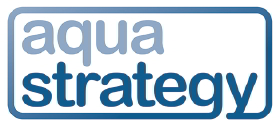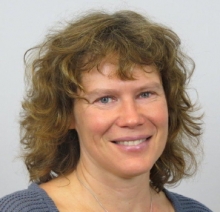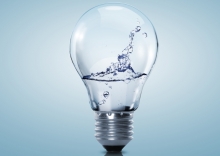Issue:
A joint initiative between the World Bank and the Danube water utility association IAWD is just starting a second three-year phase. It aims to secure improvements in the skills and capacity of water utilities in eastern Europe and to further promote reform in the governance and regulation of the sector. Keith Hayward spoke with Philip Weller, coordinator of the initiative, about the essential contribution the project is making in the region, and the lessons for efforts to improve the water sector in other parts of the world.

‘Landmark’ is the word Philip Weller uses to describe the programme he is coordinating, run jointly by his organisation, the Danube water utility association IAWD, and the World Bank to support water sector reforms in many of the countries of eastern Europe.
This programme, the Danube Water Program, has just entered a second three-year phase. There are 19 countries in the Danube basin and ten of these in eastern Europe are targeted by the programme, along with Kosovo, which is participating in its own right. Many of the countries are wrapped up in the accession process of joining or wanting to join the European Union, with its associated financial support for infrastructure improvements.
‘There is increasingly strong awareness that EU funding schemes themselves are not going to create the kind of transformations needed unless it is supported with capacity building,’ says Weller. The programme therefore represents a landmark, in Weller’s words, as it combines the policy-level weight of the World Bank with the IAWD’s links to the utility level. ‘This reinforcing of messages at different levels is something I think is key,’ he adds.
‘This effort that we are undertaking is critical, particularly in guiding some of the financial mechanisms that are available under EU programmes.’
Philip Weller, Danube Water Program Coordinator
A region in need of reform
The programme was originally launched in recognition of the challenges facing the countries of central and eastern Europe as they continue their emergence from what Weller describes as ‘very significant transformation from a political point of view’. Infrastructure needs in the region certainly need to be tackled, but wider issues include water utilities not being run efficiently or to be financially viable in the long term. This requires change within the utilities and beyond, in the frameworks that govern and regulate them.

‘The programme recognised that building and adding to the pipes, building new wastewater treatment plants and new water supply systems, in itself was not going to make for good water services,’ says Weller. ‘There had to be a commitment to changing the culture of the utilities themselves, and also the regulatory framework and the governance arrangements that were guiding them.’
The World Bank is primarily responsible for the focus on policy reforms. Work by the bank in the first phase of the programme included in particular an analysis of the sector and production of a state of the sector report. ‘This is essentially the basis for evaluating the current situation, evaluating the areas of change needed, and from an analytical point of view helping guide policymakers and decision makers in the different countries in terms of where actions are needed,’ explains Weller.
IAWD meanwhile is leading the programme’s capacity building efforts, aimed at utilities and at regulators and government officials. During the first phase, IAWD ran four main programmes, covering energy efficiency, asset management, commercial efficiency, and benchmarking. ‘This is a hands-on capacity building activity,’ comments Weller.
Alongside this, the first phase included a competitive grant process to fund various initiatives within the participating countries. ‘We made €700,000 available for any institution to come up with ideas that could improve the utility service in the region,’ says Weller.
Signs of success
The extension of the Danube Water Program into a second three-year phase reflects two things: that the first phase was sufficiently successful to justify extending the initiative; and the fact that it takes more time to bring about the types of changes needed.
‘The whole second phase is oriented towards sustainability of efforts, of finding a way to have many of the activities carry on,’ says Weller. Activities such as training will be needed into the future but cannot simply rely on external funding. ‘One of the really remarkable achievements of the first phase was to demonstrate that utilities are willing to pay for these activities, and that there is a very strong appetite,’ he says. He says that over 100 utilities were directly involved in the capacity building programmes, paying a significant proportion of their costs for participating. ‘By sharing across different countries we got benefits of cooperation that probably couldn’t be achieved another way,’ Weller adds.
This willingness to contribute to costs was also apparent in the level of participation in last year’s Danube Water Conference, which in itself was a significant event in terms of bringing together representatives of national and local government, regulators, utilities and utility associations.
Other signs of success from the first phase include national commitments sparked by the programme. These, says Weller, included commitment to improve data collection and use this to guide development and policies in Serbia, Montenegro, and Bosnia Herzegovina, for example.
Priorities for the second phase
There are three main goals for the second phase that it is hoped will form the legacies of the programme, says Weller. The first of these is for the continuation of dialogue between the various actors, as has been achieved through events such as the Danube Water Conference. This means attracting funding from other institutions, but with a significant degree of self-financing. ‘It is clear this kind of dialogue allows people to have an exchange, to share experience, to learn from one another, and we need to support that mechanism,’ says Weller.
The second goal is to achieve at least basic data collection on utility performance in all of the countries of the region, particularly to support the use of performance indicators. Considerable progress has already been made in the creation of the Danubis web-based platform, which includes data on over 600 utilities. ‘It is hoped this will become the basis for tracking the progress that happens as a result of either policy reform, regulatory reform, or individual utility performance improvement,’ says Weller.
The third goal is to achieve a strengthened network amongst the region’s water utility associations. The aim is that IAWD itself will be ‘a stronger, more effective, more financially sound institution,’ says Weller, while the goal is that the various national associations will be better able to deliver capacity building programmes to their members. The second phase of the programme will also see the launch of the Danube Learning Partnership, which aims to create a capacity building programme run jointly by IAWD and the national associations that has a basin-wide curriculum.
A question of time and timing
‘There is a recognition that we are on the right track. The issue really is whether all of that can be achieved in three years,’ says Weller. This applies also to the aim of ensuring activities are financially sustainable beyond the life of the programme. ‘The region is not completely homogeneous, so for activities in places like Moldova or Ukraine, there may be the need for some form of long term additional support,’ he adds. ‘That will be one of the challenges in the long term, to see whether that is possible and how to organise that.’
Utility reform is no easy task, even in Europe. ‘The perception is that Europe is very well developed, and everything is in order in terms of these kinds of services. That is clearly not the case,’ says Weller. ‘This process of change is going to take a couple of decades before it is complete,’ he adds.
Having said this, the programme has already shown that capacity building can help deliver quite rapid change. ‘When the circumstances are right, you see really quite remarkable improvements in utilities,’ says Weller. He recalls, for example, the experience of the asset management capacity building work, where most of the 18 participating utilities had little in the way of a systematic record of their networks. ‘In a very short time, we had half a dozen utilities who made a complete turnaround in that regard,’ he says.
A key point here is about the circumstances being right. This includes whether there is a commitment to reform within the utility itself, as well as broader issues such as whether a municipality will support tariff changes, the control or influence of a municipality over the choice of utility leadership, or complex government set-ups that lead to paralysis in the sector. In this respect, Weller sees the combination of the World Bank and IAWD as a real strength of the programme. The bank, he says, has ‘the capability to open the doors of the prime minister’. Evidence of improvements gathered from the on the ground work of the IAWD can then provide input at the highest level. ‘Those examples provide a compelling argument for some of the strategic or policy changes that are needed to make things work properly, and in that sense the programme I think has been very, very effective,’ says Weller.
‘We have no illusions that everything is going to be in order in the region after the next three years. It is going to be an ongoing process that is going to be needed after that,’ says Weller. He is though positive about the prospects. ‘The programme is built on a level of optimism that assumes there is a willingness to change, and our perception is that that willingness is there,’ he says. ‘In a few of the countries where the constellation of factors are lining up very well, you can relatively quickly get change. That creates a sort of competitive process that allows progress to be made that might not otherwise be made,’ he adds.
The European Union and funding around the accession to membership of it provides impetus for change in the region. ‘This creates a certain dynamic for change, particularly in the water sector, and water is one of the highest investment sectors of any under the accession process,’ notes Weller. ‘This effort that we are undertaking is critical, particularly in guiding some of the financial mechanisms that are available under EU programmes.’
Weller acknowledges that the circumstances in the region, especially around EU accession, meant the timing was right. Nonetheless, he sees that the approach of linking the policy-level activity of the World Bank with the on the ground activity of IAWD provides lessons for other parts of the world. ‘From what I am familiar with on a world scale, there has not been the kind of effort that we have undertaken in a regional sense anywhere else in the world,’ says Weller. ‘I would say it has worked very, very well, and is something I think other regions of the world need to look at.’
For more information, visit:
Danube Water Program, www.danube-water-program.org
DANUBIS – Danube Utility Benchmarking and Information Sharing platform, www.danubis.org
Related article: The World Bank-backed assessment of water and wastewater services in the Danube region
Related article: Albanian action on water utility reform
Keywords:
- World Bank, IAWD, Danube, utility management






